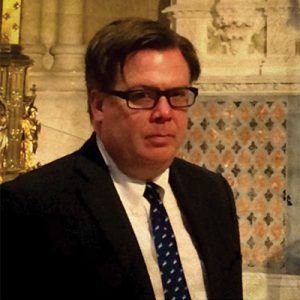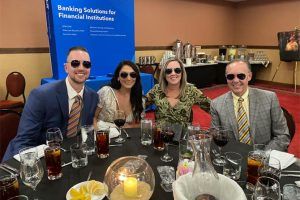How did you get started in banking?
I started my banking practice with J.P. Morgan in New York. My full-time work for Morgan ran concurrently with my full-time studies at NYU. I was assigned to the American Depository Receipts Desk, which offered customers a way to purchase stocks in overseas companies that were otherwise unavailable to investors through U.S. stock exchanges. I began working on Wall Street to support my academic pursuits. I didn’t have the intention of becoming a banker per se. Initially, I viewed banking as a means to an end. It turned out that I was pretty good at it. I frequently ask bankers to share their career goals with me. I find that many bankers do not set out to become bankers but discover the potential to have a highly fulfilling career in banking.
After living, studying and working in New York for seven years, I returned to New Mexico and was hired at United New Mexico Bank, which transitioned into Norwest Bank, which ultimately became Wells Fargo.
My career in banking began a mere thirty-seven years ago.
What has been the best part of being in the banking business?
The ability to help people is the best part of banking for me. I have the honor of helping customers with one of the most profoundly important aspects of their respective lives: money. I have never forgotten Mr. Micawber’s advice since I first encountered it: “Annual income twenty pounds, annual expenditure nineteen pounds nineteen and six, result happiness. Annual income twenty pounds, annual expenditure twenty pounds ought and six, result misery.” Money pays for all of the things we need and want. When money is managed well, it can be liberating and empowering. When it is managed poorly, it can become a source of unnecessary pressure and great distress. Money can impact whether or not we each get to pursue happiness. It can create security in one’s life. The lack of it can result in abject poverty and unnecessary suffering. Acquiring and saving money can be challenging, and managing it can be complex. Helping people successfully manage their money has a profound impact on their lives which lends (pun intended) a certain nobility to our profession – our understanding of money obliges us to help our customers succeed financially.
What changes do you foresee in our industry and New Mexico in the next several years?
Whatever the changes to come, be assured that they will continuously arrive and always be early. Five years ago, during conferences and meetings, I suggested to bankers that technology would change our industry dramatically and that its pace would be faster and more comprehensive than all of the developments in the preceding twenty years. My prediction was understated. Simple service transactions are migrating to mobile devices at fleet velocity. We are training bankers more comprehensively and quicker than those of yesteryear as a direct result of technological advancements.
Wherever bankers are situated in the world, including New Mexico, we need to be prepared to advise our customers about myriad options capable of making profound improvements in their personal economies. The opportunities for bankers to meet the challenges and excel on behalf of clients are thrilling to me. Just now, I’m thinking of the days of the abacus, the oldest calculating tool aside from fingers; the banker’s first calculator. I imagine the conversations about money two thousand years ago employing an abacus, and then I contemplate a given conversation with a banker starting their career today. Next, I envision a conversation between a customer and a banker five years from now. That banker will have a BIG story to tell about the journey they and their clients have traveled.
Who has had the greatest influence on your career and why?
My wife Cassandra and my two brothers, Donald and Andrew, have had the greatest influence on my career. We are all bankers. Cassandra has helped me to be a better banker. She is the most empathetic banker I know and the most encouraging, especially when times are tough. She has taught me much about loyalty and courage. My brother Donald is the most directly responsible for my career in banking. What did I know as a seventeen-year-old kid just beginning in banking? Donald had already begun his journey into global finance and spoke to me about the merits of the profession. He compelled me to apply at Morgan, and we have been helping each other improve at banking for a long time. What a run. We lost our brother, Andrew, earlier this year. Andrew started his career as an actor in Los Angeles before returning to New Mexico to embark on a banking career. I compelled him to apply to Wells Fargo. Andrew was the most versatile banker amongst us, having worked in the regional, commercial and investment aspects of banking. He was one of my best men and remains my wingman.
I have also been fortunate to know many extraordinary leaders and colleagues throughout my career. Every fellow employee influences me because we are linked in this noble profession dedicated to helping our customers.
Do you have any advice for young bankers?
I love asking new bankers to recall when they were younger and share with me what they wanted to be when they grew up. Some of the proverbial responses are lawyer, doctor, nurse, athlete, policeman, firefighter, soldier, teacher, flight attendant, architect, engineer, scientist, physical therapist, pharmacist, rancher, farmer, veterinarian, computer programmer, politician, business person, musician, artist, etc. – the list goes on and on. A long time ago, my father advised me to use banking to my best advantage to learn, grow, and help others. I share this same advice with young bankers I meet today. Banking is one of the last great apprenticeships. You learn the job along the way, and you get better over time. The bank provides training and education throughout one’s career, and there is no end to the learning process because banking always evolves.
Some bankers utilize a career in banking to follow other career goals. Banking has launched numerous careers outside of the financial industry. I know people from all walks of life (including a Jesuit priest) who began their careers in banking and went on to other jobs to fulfill their ultimate career goals.
Many of us have remained bankers.
When bankers tell me what they wanted to be when they grew up, I always tie their responses back to the people they serve. If you are a banker long enough, you will invariably meet people engaged in many of the various careers imagined by all of the bankers I have queried. In many ways, a career as a banker fulfills a deep curiosity about one’s fellow human beings and their respective lives. Early in my career, I had the privilege of assisting my customer, an ichthyologist, obtain a loan. I had no idea what type of work an ichthyologist performed, but I found out and was fascinated. After all, it’s not every day that you meet someone who knows everything there is to know about fish.
Tell us about your family.
Cassandra and I became grandparents in March of this year when we were blessed with the arrival of Saylor Rae. Our daughter Alleyne and son-in-law Ralf are proud parents who are mustering out of the United States Navy, where Ralf has served for the past five years. Ralf is continuing his education to become a physician’s assistant. Alleyne is a very successful esthetician. Our son Kevin is a high school senior full of hope and promise. I have a tendency to spoil my family when I can, but recently I forewarned them: Saylor is now number one.
What are your interests outside of banking?
Faith, family, community, work, health, music, art, food, travel, adventures, reading and writing. n







